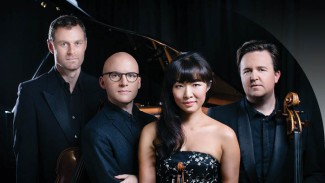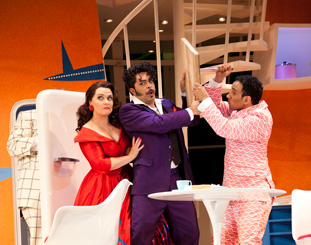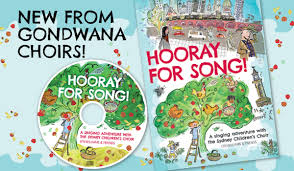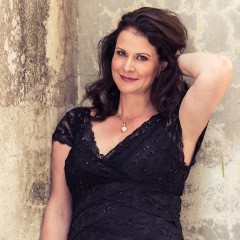Concert Review: Senses & Sensibilities/ Australia Piano Quartet
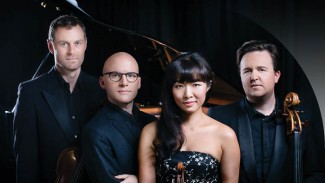
Senses & Sensibilities – Australia Piano Quartet
Rebecca Chan (Violin), James Wannan (Viola), Thomas Rann (Cello), Daniel de Borah (Piano)
With special guests: Dr. Jordan Nguyen, Jessica Irwin
16 July 2016, Utzon Room, Sydney Opera House
The Australian Piano Quartet (APQ) has a stated aim for each concert of programming a recognised masterpiece, an unfamiliar item and a first performance of a new work, or of reintroducing a previously performed Australian work. Their Senses and Sensibilities concert followed this commendable pattern.
The APQ is the Ensemble in Residence at the University of Technology Sydney. As such they are surrounded by new technological developments. The focus of this concert was a new work, Whispering Pectoriloquy, which is a collaboration between the APQ’s violinist Rebecca Chan (who is also a medical doctor) and Dr. Jordan Nguyen, a TV presenter and biomedical engineer. This new work was written for the concert’s guest performer, Jessica Irwin, a successful commercial photographer who has cerebral palsy. Nguyen has devised a digital apparatus which is triggered by an eye-tracking device. He explained that Irwin was able to control the digital equipment by the movement of her eyes which allows her to select various sound pitches and percussive effects. By blinking at specific moments she replicates the clicking of a computer mouse. This allows her to play the sounds required by the score via loudspeakers connected to the computer. For this performance two video screens allowed the audience to see how Irwin was controlling the sounds she generated.
The marriage of the acoustic and digital components was well-coordinated and resulted in an atmospheric piece lasting some 12 minutes. It consisted of several sections in which energetic episodes contrasted with more relaxed periods during which the sounds of the string instruments playing in their high register was matched by similar, well blended digital sounds. The score for the APQ incorporated a wide range of playing techniques which were offset by various percussive effects from the digital component.
The work was very well received with a standing ovation by the full house. It seemed that many people had come specifically to hear this performance. The applause after every movement of the conventional works on the program suggested this may not have been the APQ’s regular chamber music audience.
The concert had opened with a spirited performance of Mozart’s Piano Quartet in g minor, K.478. This displayed the APQ’s well-integrated sound, keen ensemble discipline and interpretative unanimity, clearly resulting from their five years’ ensemble playing together.
The concert concluded with Richard Strauss’s early Piano Quartet in c minor Op.13, dating from 1885 (which the program leaflet confusingly listed as a Piano Quintet in E Flat major Op. 44 – which is by Schumann). The Strauss quartet is heavily influenced by Brahms but it does include several passages which foreshadow Strauss’ later, better-known works. In the first movement there were unison string passages over a stormy piano accompaniment which could easily have been sketches for passages in Strauss’ later operas. The second movement scherzo produced virtuoso playing from all the players amid complex syncopated rhythms. The slow third movement had lush, romantic cantabile lines and the energetic last movement brought the work to a virtuoso conclusion.
Rebecca Chan played superbly and led the quartet with confidence and a fine sense of the structure for each movement. The Utzon Room’s dry acoustic, however, occasionally added a slight edge to her forthright tone.
The absence of a second violin in the piano quartet format allows a greater prominence for the viola than in a string quartet. It was a real pleasure, therefore, to hear such fine viola playing from James Wannan who made the most of his opportunities in both conventional works with strong playing and resonant tone.
Thomas Rann played the cello with an attractive, warm sound and sensitive phrasing. There were times when his fine playing was sometimes more reticent than it needed to be.
The piano playing of Daniel de Borah encompassed the full range of musical demands. When required, he provided a reliable framework for the string players with a supportive accompaniment and many delicate cantabile passages, especially in the slow movements. His technique was also fully equal to the many challenging virtuoso passages.
The overall impression from the concert was of an adventurous program in which the APQ confirmed its reputation as a secure, well integrated quartet in which each member is a distinguished soloist.
The APQ will be touring Europe and China during September before returning to Melbourne on 5 October and Penrith on 15 October. Their next concert in the Utzon Room will be on 22 October for which their guest tenor soloist will be Andrew Goodwin. The program will also include Schubert’s Trout Quintet.
Larry Turner for SoundsLikeSydney©
Larry Turner is an avid attender of concerts and operas and has been reviewing performances for Sounds Like Sydney for several years. As a chorister for many years in both Sydney and London, he particularly enjoys music from both the great a capella period and the baroque. He has written programme notes for Sydney Philharmonia, the Intervarsity Choral Festival and the Sydneian Bach Choir and is currently part of a team researching the history of Sydney Philharmonia for its forthcoming centenary.

